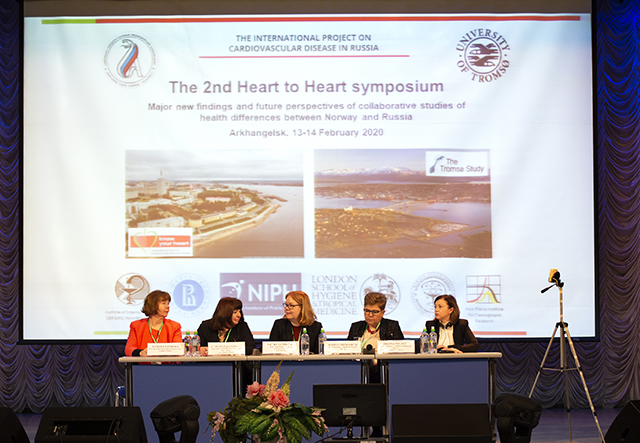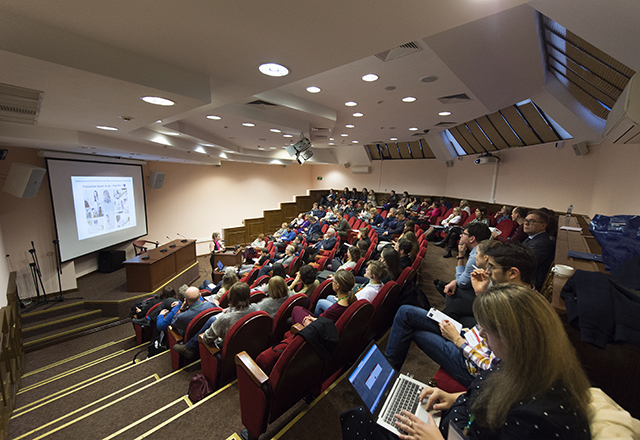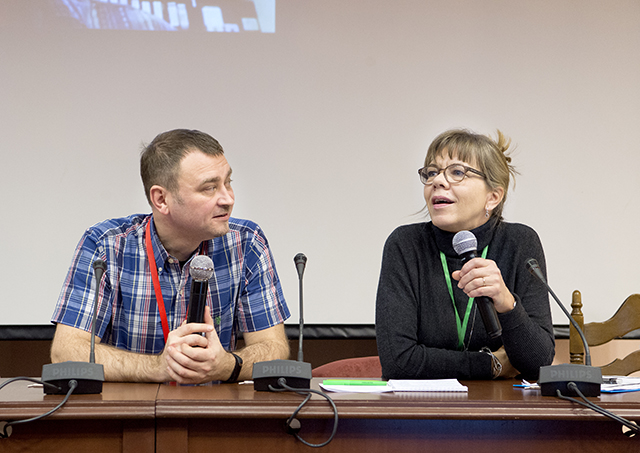Heart to Heart symposium II: Arkhangelsk 2020
The symposium was held at Northern State Medical University (Arkhangelsk, Russia). The key motivation behind this was still the striking fact that the mortality from cardiovascular disease among the working-age population in Russia in 2012-2016 was eight times higher than in Norway.

Since 2018, the causes of the observed difference have been investigated within Russian-Norwegian Heart to Heart initiative - a series of comparisons of data on cardiovascular health and beyond gathered in population studies (Know Your Heart Study in Russia vs. Tromsø Study 7 in Norway) aiming to strengthen the evidence base for better primary and secondary prevention of cardiovascular and other non-communicable diseases in both countries. The purpose of the 2nd Heart to Heart symposium was to present and discuss major new findings and future perspectives of collaborative studies of health differences between Norway and Russia.

The event gathered more than 120 participants including senior and early career researchers, clinicians and students from Russia, Norway, UK, and Germany. The event was attended by representatives of Norwegian and Russian health authorities, and the participants were welcomed by the Deputy Minister of Health of the Russian Federation, outlining the high value of the Russian-Norwegian research collaboration in health for improving the life quality and life expectancy.
Highlights presented at the symposium were;
- Substantial decline in cardiovascular mortality in Russia since 2005 and onwards, of which the main drives behind the observed decline is a decrease in hazardous alcohol drinking, decrease in smoking among men, and the growing availability of high-tech medical care
- Some traditional cardiovascular risk factors are higher in Russia (hypertension and diabetes in both sexes, smoking in men, obesity in women) compared to Norway
- The estimated joint impact of four conventional cardiovascular risk factors (systolic blood pressure, cholesterol, smoking, diabetes) on cardiovascular mortality differences between Russian and Norwegian populations is estimated to be only 33% for men and 22% for women
- Comparisons of data from examinations of heart and carotid arteries (electrocardiograms, echocardiography, carotid ultrasound), laboratory biomarkers (troponin T, Pro-BNP), and physical function tests (grip strength) point to earlier biological aging in the Russian Know Your Heart participants compared to the Norwegian Tromsø Study participants
- Studies of treatment of myocardial infarction in Russia showed delays in receiving seeking medical attention as well as delays in receiving medical care, suggesting potential targets for improvement
- Comparative studies of the validity of the cardiovascular cause of death data in Russia and Norway performed by medical pathologists and forensic experts from both countries conclude that the differences in how deaths are certified and coded may lead to some between-country differences within the group of cardiovascular causes of death, but there is no evidence that these differences can explain the observed large difference in the total cardiovascular mortality between the countries

The presentations at the symposium gave valuable new insight into the differences in health between Russia and Norway. Top priority areas to ensure continued downward trends in cardiovascular mortality among Russians emerging from discussion of findings were further investments in the health sector (primary and high-tech care), improved control of hypertension, and continued successful work to reduce smoking and alcohol consumption.

One of the key conclusions was that the results of our cross-sectional studies only partly explain the causes for the significantly higher cardiovascular mortality from in Russia compared to Norway. A deeper understanding of the differences requires longitudinal data that should in more detail describe lifestyle factors (physical activity, nutrition, alcohol use), social and medical factors (stress, quality of life, availability/quality of health care/medication), environmental factors (pollutants), and microbiological and molecular-genetic factors. Finally, the participants have agreed that joint planning of the 8th Tromsø Study and 2nd Know Your Heart study should be a natural extension and the next step of Heart to Heart collaboration.
Sist oppdatert: 13.02.2022 08:23